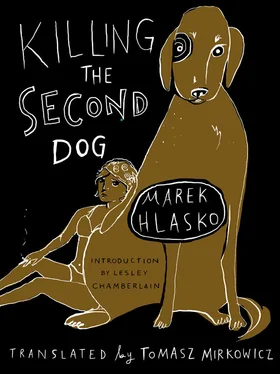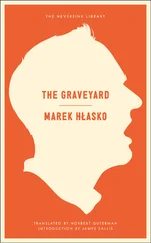In 1966 some promise appeared on the horizon. His old friend from Warsaw, Roman Polanski, now a successful film director in America, invited him across the Atlantic. Polanski, already famous for Knife in the Water , was beginning to work on Rosemary’s Baby . With access to Hollywood and a new circle of Polish-speaking friends Hlasko had his best chance yet to start again. He was of the same traumatized generation as Polanski, who though he was born in France had grown up in Poland from the age of three and survived the Holocaust there. Both of Polanski’s Jewish parents had died in Nazi death camps. In Knife in the Water one can see perhaps that sense of life as a barely concealed existential duel, between one man and another, over who has the possessions and the power; and where, differently, happiness might lie. A special joy for Hlasko was his friendship with the composer Krzysztof Komeda, who had written the music for Knife in the Water and was a key member of Polanski’s team. Yet it seems that Hlasko, by the time he reached America, was emotionally so extremely fragile, the result of all he had seen in wartime Poland, and all that happened to him after, that even in happier circumstances he could barely cope without alcohol.
One night he and Komeda were so drunk that Komeda fell into a ditch and cut his head open. Trying to help him Hlasko himself fell and may have worsened the injury. Komeda recovered, only to succumb to a blood clot on the brain five months later. Apparently, this was the last loss Hlasko could endure. Perhaps with his grief compounded by guilt, he killed himself in June 1969 with an overdose of pills in a hotel in Wiesbaden, at last enacting for real the suicides his alter ego had faked in the fraud plots of Killing , and making up for the Munich failure six years earlier. He had been on his way back to Israel via West Germany, shuttling between countries. He was, aged 35, a man without friends, without money, without a home. Life was unbearable.
The world lost Marek Hlasko early. Polanski, the same generation and long since an international figure, and Marek Nowakowski, the comparatively obscure prose writer who remained in Poland and managed to write through the communist era despite the hurdles put his way, are, for the sake of comparison, still alive. Hlasko became so famous in such a short time, and yet nothing could compensate for the damage life did to him. He was a child and a young man in an age which had almost abandoned humanity. The feelings of displacement and loss were overwhelming.
Hlasko was first translated into English in the late 1950s, reflecting the West’s eventual reception of works published during the East Bloc thaw that followed Stalin’s death, and again in the early 1990s, after communism collapsed and the world had free access once more to cultures that had been locked away behind the Iron Curtain. After two cycles of interest in his work the latest rediscovery of him simply reflects the unique quality of his prose. In tune with the writerly spirit of the times that Sartre identified, Marek Hlasko created an anguished post-war literature all his own.
Lesley Chamberlain
THE RIDE FROM HAIFA LASTED OVER TWO HOURS. ABOUT halfway to Tel Aviv, we realized that the man sharing the rundown cab was in a bad way. The driver said we would soon reach the outskirts of the city and stepped on the gas, taking each turn with a screech of wheels that made us feel like actors in some B-grade movie. At one point a cop raised his hand to stop us, but the driver didn’t slow down. In the rear-view mirror we saw the cop turn to his Harley standing in the shade, but he just shook his head; it was too hot to bother. He stood in the middle of the road, took off his helmet, and started wiping the sweat off his forehead.
“How is he?” the driver, without turning around, asked.
“Almost gone,” Robert said and then looked at me. “Now he’ll have lots of quiet and plenty of shade. Think he’ll like it?”
“Do you know him?” the driver asked.
I had to hold our dog by the collar; he was fidgeting and growling. The dying man must have made him nervous. “No,” I said.
In Tel Aviv the stranger died as soon as the three of us carried him out of the cab. He was lying stretched out on a bench while we waited for an ambulance. Some decent soul placed a photo magazine over his face. It had the picture of an actor on the cover; his blue eyes watched us with a piercing stare. Robert lifted the magazine and peered at the dead man’s face.
“I think he was Romanian,” he said. “Just arrived from Europe. He didn’t speak a word of Hebrew.”
“He won’t have to learn it now.”
“This is a bad sign.”
“You mean him?”
“What else?” Robert said. “I’m superstitious. This may spoil the whole deal for us. We should’ve taken the train.”
“Poor fellow, he’s not buried yet, and he’s already made another enemy.”
“That’s right,” Robert said. “I hope they stick the bastard in a coffin and bury him deep.” He looked at the driver, who was leaning over the corpse, trying to recognize the actor on the magazine cover. “We’re leaving, buddy. Haven’t got much time.”
“It’s John Wayne,” the driver said finally, lifting his head. “Can’t you wait a bit longer? You know how it is with the cops. They always think everything happened different than you tell them. You’d be doing me a real favor.”
“We have some business to take care of,” I said, “but we’ll be staying at a hotel across the street. Fifty-six Allenby. If the cops ask about us, give them our address.”
“Oh, they’ll ask for sure,” the driver said, again leaning over the corpse. “No, I guess it wasn’t John Wayne I saw in Pursued . Must’ve been some other guy.”
We crossed the street and walked into our hotel. The desk clerk was sitting at the end of the lobby, reading a book. I thought of the dead man and glanced at the cover that showed some guy murdering some broad, or maybe it was the other way around.
“Had a nice trip?” the desk clerk asked.
“It lasted over two hours,” I said. “And some fellow we didn’t know who was riding with us died right there in the cab. He was leaning against Robert the whole time.”
“Stupid bastard,” Robert said. “And a bad sign if I ever saw one. Have you got two beds for us, Harry?”
The desk clerk didn’t answer. He kept on reading. I glanced again at the lurid cover.
“For ready cash,” Robert added.
The desk clerk finally put the book down. “How long do you want to stay?”
“We don’t know yet,” I said. “We came here to make some cash. That’s why Robert’s sore. He’s convinced the corpse might mess things up.”
“Are you going to try to marry him off again?” the desk clerk asked Robert.
“Sure. Hasn’t it worked before?”
The desk clerk looked at me closely. “He’s old. And he looks goddamn tired.”
“Don’t worry about me, Harry,” I said. “Leave it to Robert. He knows how to make those broads part with their money.”
“Sure, I know,” Robert said. “The main thing is to have an idea. And I’ve still got lots of ideas for this guy.”
“He is old ,” the desk clerk insisted.
“Leave it to me. I know best. His gloomy face is still worth its weight in gold. So, have you got those two beds or haven’t you?”
“You’ll have to pay for the dog, too. Hotel rules.”
“We already paid once. When we bought it.”
“How much?”
“Almost a hundred pounds. It’s a purebred. Did you think we got it for free? And with a nanny to take it out for walks? You didn’t think that, did you?”
Читать дальше












